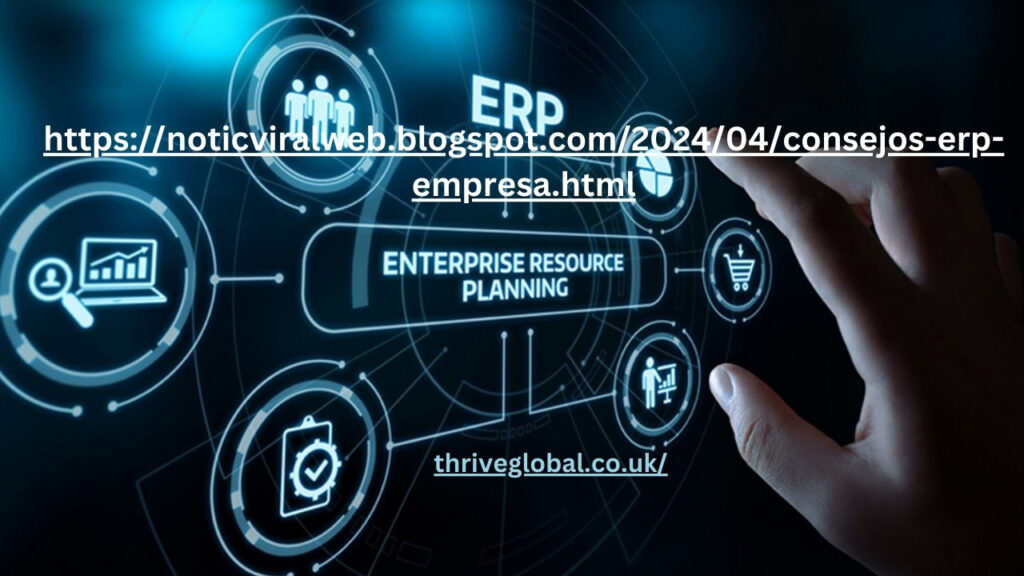Introduction to https://noticviralweb.blogspot.com/2024/04/consejos-erp-empresa.html
Enterprise Resource Planning (ERP) refers to software systems used to manage and integrate the core processes of an organization. These systems centralize data and provide real-time insights across various departments, such as finance, human resources, supply chain, and customer relationship management. https://noticviralweb.blogspot.com/2024/04/consejos-erp-empresa.html
Benefits of ERP Systems
ERP systems offer numerous benefits to businesses, including:
- Enhanced Efficiency: By automating repetitive tasks and reducing manual entry, ERP systems streamline operations and improve overall efficiency.
- Improved Data Accuracy: With a centralized database, ERP systems ensure that data is consistent and up-to-date, reducing errors and redundancies.
- Better Decision-Making: Real-time data and analytics provide valuable insights, enabling informed decision-making and strategic planning.
- Scalability: ERP systems are designed to grow with your business, easily accommodating new processes, departments, and users.
- Regulatory Compliance: ERP systems help businesses comply with industry regulations by maintaining accurate records and providing audit trails. https://noticviralweb.blogspot.com/2024/04/consejos-erp-empresa.html
Choosing the Right ERP System
Assessing Business Needs
The first step in selecting an ERP system is to assess your business needs. Consider the following factors:
- Current Processes: Identify the processes that need improvement and how an ERP system can address them.
- Future Growth: Ensure the ERP system can scale with your business and support future expansion.
- Budget: Determine your budget for the ERP system, including implementation and ongoing maintenance costs. https://noticviralweb.blogspot.com/2024/04/consejos-erp-empresa.html
Evaluating ERP Vendors
Once you have a clear understanding of your needs, evaluate potential ERP vendors. Key considerations include:
- Reputation: Look for vendors with a strong track record and positive customer reviews.
- Industry Experience: Choose a vendor with experience in your industry, as they will better understand your unique requirements.
- Support and Training: Ensure the vendor offers comprehensive support and training to help your team get the most out of the system.
Key Features to Look For
When comparing ERP systems, prioritize the following features:
- User-Friendly Interface: A system that is easy to navigate will reduce the learning curve and increase user adoption.
- Customization: Look for a system that can be tailored to your specific business needs.
- Integration: Ensure the ERP system can integrate with your existing software and systems.
- Scalability: Choose a system that can grow with your business.
- Analytics and Reporting: Robust reporting capabilities will provide valuable insights and support data-driven decision-making.https://noticviralweb.blogspot.com/2024/04/consejos-erp-empresa.html
Implementing ERP Systems
Planning and Preparation
Successful ERP implementation requires careful planning and preparation. Follow these steps:
- Define Objectives: Clearly define the objectives and goals of the ERP implementation.
- Develop a Project Plan: Create a detailed project plan outlining the timeline, milestones, and responsibilities.
- Allocate Resources: Ensure you have the necessary resources, including personnel and budget, to support the implementation.
Training and Support
Proper training and support are crucial for a successful ERP implementation. Consider the following:
- Comprehensive Training: Provide thorough training for all users to ensure they understand how to use the system effectively.
- Ongoing Support: Offer ongoing support to address any issues and ensure users remain proficient with the system.
Data Migration Strategies
Data migration is a critical aspect of ERP implementation. Follow these best practices:
- Data Cleansing: Cleanse your data to ensure accuracy and consistency before migration.
- Data Mapping: Map your data to ensure it is correctly transferred to the new system.
- Testing: Conduct thorough testing to identify and resolve any issues before going live.
Optimizing ERP Performance
Customization and Integration
Customizing your ERP system to meet your specific needs can enhance its performance. Consider the following:
- Tailored Workflows: Customize workflows to align with your business processes.
- Third-Party Integrations: Integrate your ERP system with other software to streamline operations and improve efficiency.
Regular System Updates
Regular updates are essential to keep your ERP system running smoothly. Follow these tips:
- Stay Current: Keep your system up-to-date with the latest software releases and patches.
- Monitor Performance: Regularly monitor system performance to identify and address any issues.
Performance Monitoring
Continuous performance monitoring is crucial to ensure your ERP system is operating optimally. Consider these strategies:
- KPIs: Establish key performance indicators (KPIs) to measure system performance.
- Regular Reviews: Conduct regular reviews to identify areas for improvement and implement necessary changes.
Overcoming Common ERP Challenges
Managing Resistance to Change
Resistance to change is a common challenge during ERP implementation. Address this by:
- Communication: Communicate the benefits of the ERP system to all stakeholders.
- Involvement: Involve employees in the implementation process to increase buy-in and reduce resistance.
Ensuring Data Accuracy
Data accuracy is critical for the success of your ERP system. Ensure accuracy by:
- Data Entry Protocols: Establish clear data entry protocols to maintain consistency.
- Regular Audits: Conduct regular data audits to identify and correct any inaccuracies.
Addressing Security Concerns
Security is a top priority for ERP systems. Address security concerns by:
- Access Controls: Implement strict access controls to protect sensitive data.
- Regular Security Assessments: Conduct regular security assessments to identify and mitigate potential risks.
Future Trends in ERP Systems
Cloud-Based ERP Solutions
Cloud-based ERP solutions offer numerous benefits, including:
- Scalability: Easily scale your ERP system as your business grows.
- Accessibility: Access your ERP system from anywhere with an internet connection.
- Cost Savings: Reduce costs associated with on-premises hardware and maintenance.
AI and Machine Learning Integration
Integrating AI and machine learning into your ERP system can enhance its capabilities. Benefits include:
- Predictive Analytics: Use AI to analyze data and predict future trends.
- Automation: Automate routine tasks to improve efficiency and reduce manual effort.
Mobile ERP Applications
Mobile ERP applications offer increased flexibility and accessibility. Benefits include:
- Real-Time Access: Access your ERP system in real-time from any location.
- Improved Productivity: Enable employees to complete tasks on the go, improving overall productivity.
Conclusion
ERP systems are invaluable tools for businesses looking to streamline operations and improve efficiency. By following the essential tips outlined in this guide, you can successfully implement and optimize an ERP system that meets your unique business needs. Stay informed about future trends and continuously monitor and update your system to ensure it continues to deliver maximum benefits. https://noticviralweb.blogspot.com/2024/04/consejos-erp-empresa.html
Frequently Asked Questions
What are the key benefits of ERP systems?
ERP systems offer enhanced efficiency, improved data accuracy, better decision-making, scalability, and regulatory compliance.
How can I choose the right ERP system for my business?
Assess your business needs, evaluate ERP vendors, and prioritize key features such as user-friendly interfaces, customization, integration, scalability, and robust analytics.
What are common challenges during ERP implementation?
Common challenges include managing resistance to change, ensuring data accuracy, and addressing security concerns.
How can I optimize the performance of my ERP system?
Optimize performance through customization and integration, regular system updates, and continuous performance monitoring.
What are the future trends in ERP systems?
Future trends include cloud-based ERP solutions, AI and machine learning integration, and mobile ERP applications.
How can I overcome resistance to change during ERP implementation?
Overcome resistance by communicating the benefits of the ERP system, involving employees in the process, and providing comprehensive training and support.



